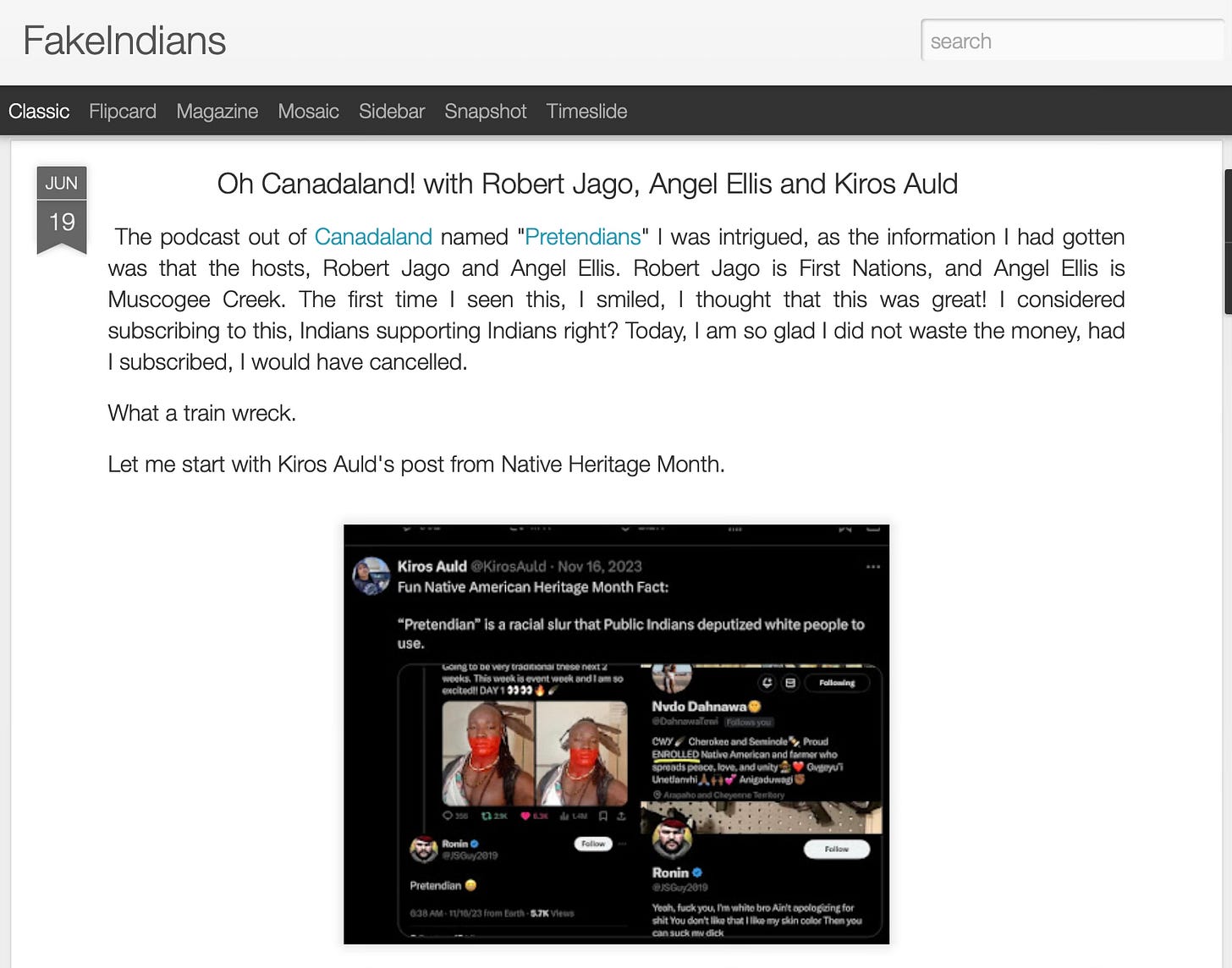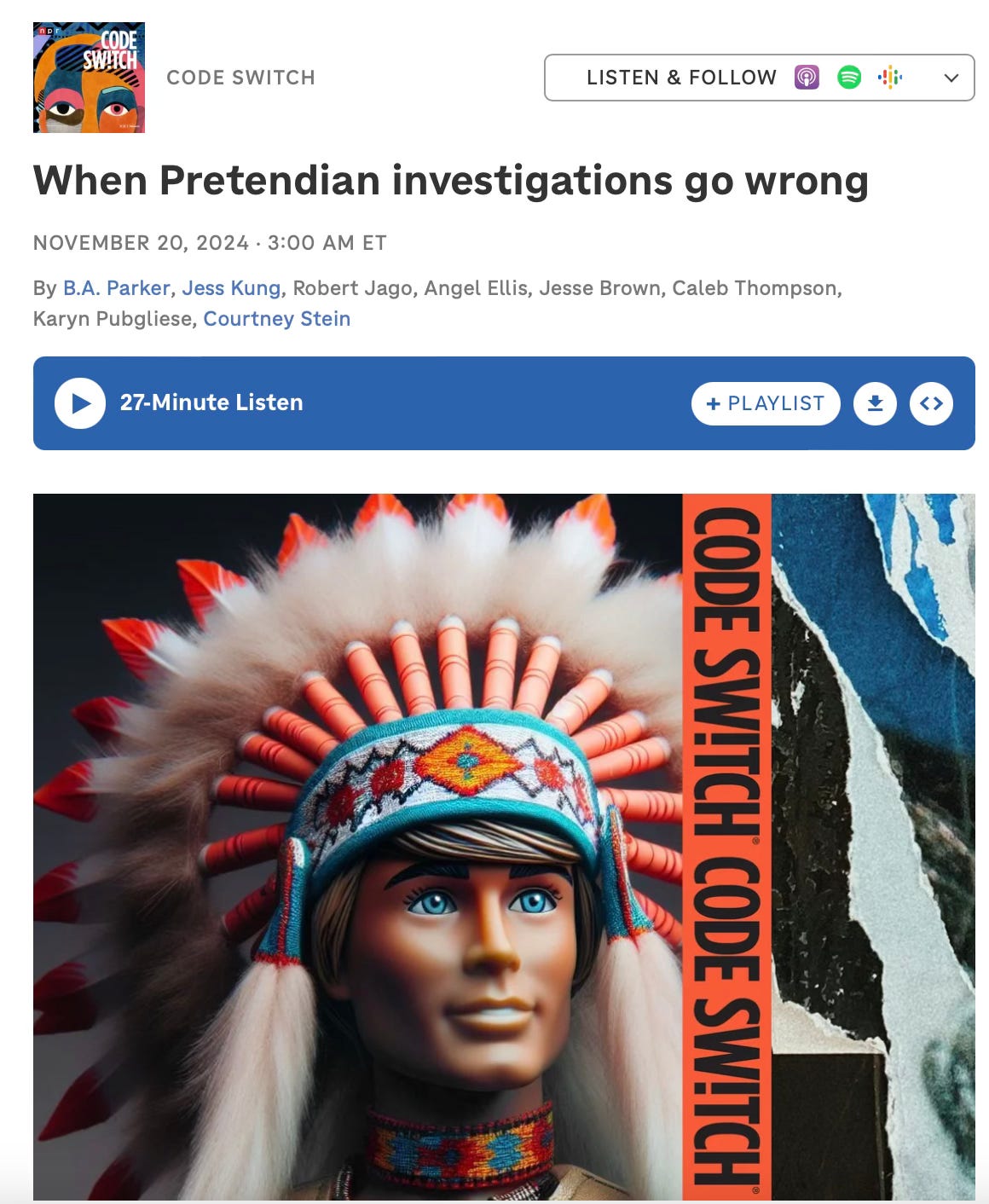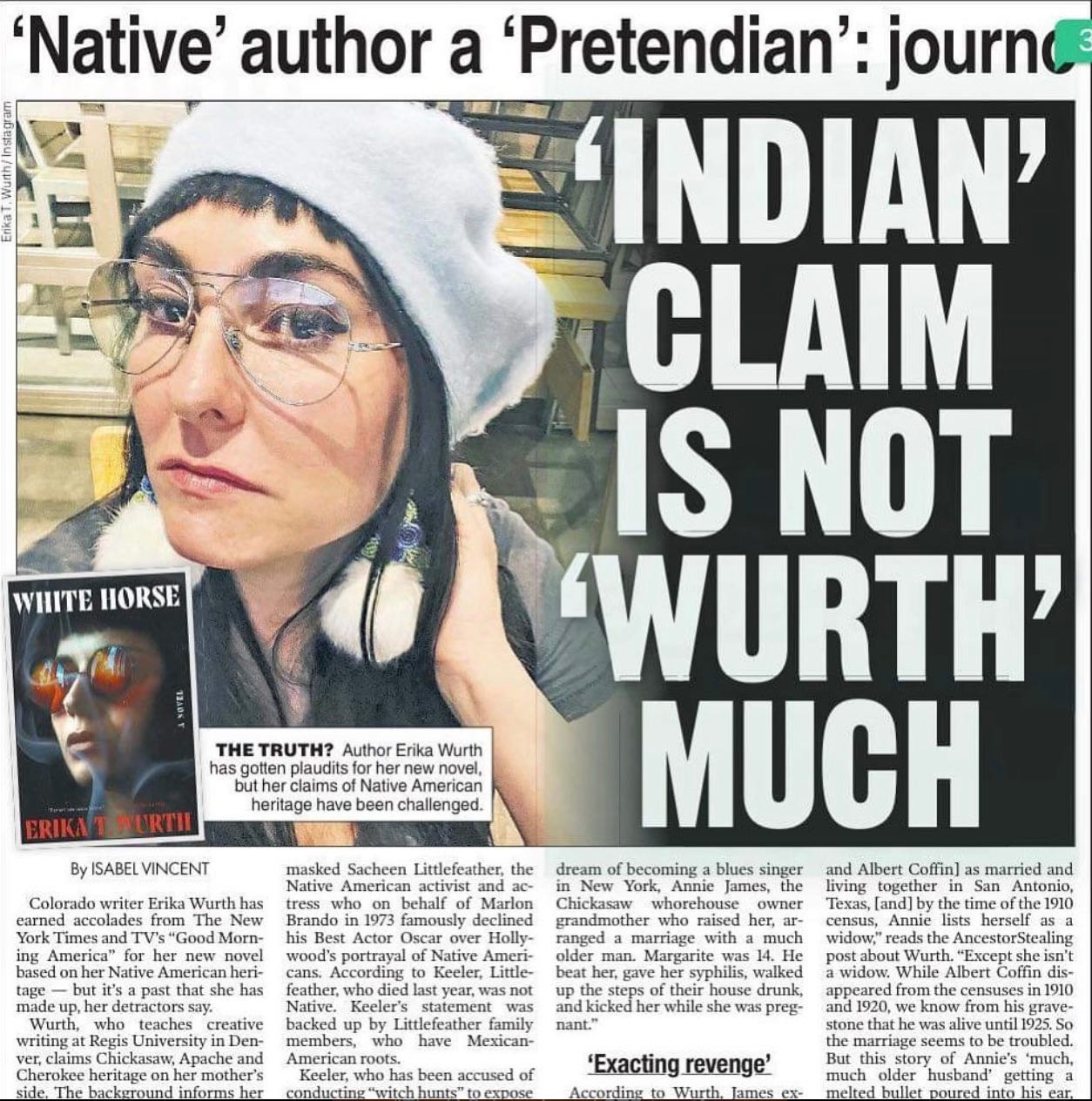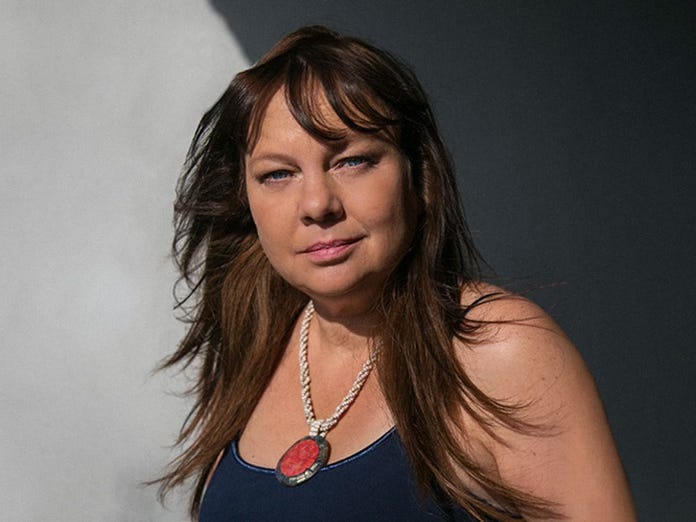When NPR Attacks a Native Woman During Native American Heritage Month
NPR's 'Code Switch' Sides With Frauds Against Native People Seeking Accountability
On Wednesday, November 20, 2024, I woke up to a Native journalist texting me:
"NPR is playing the episode. You should contact the NPR Public editor."
The 'episode' is a June-broadcast Canadaland podcast show called "Pretendian Hunters." As far as I can recall, only a solitary 'Pretendian hunter' is named-checked, and that is me, Jacqueline Keeler.
My editor at the San Francisco Chronicle described NPR's Code Switch to me as one of their "marquee shows," discussing, as its tagline says, "the fearless conversations about race that you've been waiting for. Hosted by journalists of color, our podcast tackles the subject of race with empathy and humor."
It is broadcast across the United States, and chose to rename the episode (which was unchanged in its content) "When Pretendian investigations go wrong."
The only problem? The only journalist investigation that went wrong was the one conducted by Canadaland.
It was wrong to claim that I had retracted my findings that Kiros Auld, who claims to be Pamunkey, was a Pretendian. I did not and asked for a correction in June, which I never got. Canadaland's producers and hosts have yet to respond to my emails.
And there is the glib acceptance of Auld's claims. When he says, “I’m embraced as Pamunkey by other Pamunkey people.” One of the hosts responds with, "Good enough for me." And then away they go with the premise of the show.

They did not engage in my research or even ask to see it. And when I was interviewed for the show several months earlier, it was about another Pretendian, writer Erika Wurth. My team found her to have no Native ancestry, and our findings made a very interesting New York Post headline, "'Indian' Claim Is Not 'Wurth' Much."
Say what you will about that tabloid's politics; at least they engaged and listened to Native researchers, which include not only me, a Native journalist, but Native American college professors, authors, historians, and genealogists. Some of the most educated Native people in the country. But NPR producers for a show that purports to discuss race with empathy? NPR Code Switch staff didn't even bother to contact the Tribe or me before they rebroadcast the episode. They should have done their due diligence.
I forwarded the NPR Code Switch link to the Pamunkey Chief, Robert Gray. He had previously told Canadaland that Kiros Auld was not a tribal member and emailed NPR the same message again.
Today, November 20, 2024, NPR posted a podcast produced by Canadaland titled, "When Pretendian investigations go wrong". NPR's description states - "Robert talks to Jacqueline Keeler, the person behind the "Alleged Pretendians List". Then, he talks to Kiros Auld, whose name appeared on that controversial list. The problem? Kiros is legitimately Native."
The real problem is that Kiros is NOT legitimately Native and the Canadaland producer, Karyn Pugliese (identified as a creator of the podcast on the NPR site), knew this back in June 2024.
My name is Robert Gray and I am Chief of the Pamunkey Indian Tribe, a federally-recognized tribe in Virginia and the Tribe that Kiros claims. Here is an email trail between Karyn and me.
*********************************************************
Sent 6/11/24
From: Robert Gray
To: karyn@canadaland.com
I recently listened to the Pretendian Podcast, Episode "Pretendian Hunters". At the 12:20 mark, hosts Robert Jago and Angel Ellis describe their 3-part test for identifying who is a Pretendian. The first criteria is that the person is not enrolled in a tribe. The third criteria is whether the Tribe being claimed by the individual accepts them as a tribal member.
At the 16:55 mark, the discussion turns to an individual named Kiros Auld, who was identified by another individual as a Pretendian. Robert stated, "Well, we looked into his background and there's enough there to show that he almost certainly is not a Pretendian. His mother and grandmother had tribal membership."
The problem is that Robert did not look very far into the individual's background. As the Chief of the Pamunkey Indian Tribe, I can say with absolute certainty that neither Kiros, his mother nor his grandmother are enrolled citizens of the Pamunkey Indian Tribe and the Tribe does not accept them as tribal citizens. Per Robert's own criteria, Kiros Auld is a Pretendian.
I would hope to hear a retraction on a future podcast.
In June, Karyn Pugliese, Canadaland's editor-in-chief, and a First Nations journalist, and a 2020 Harvard Nieman fellow, responded:
Thank you, Chief Gray,
Let me look into this and pass this to the team. I will get back to you.
Cheers,
k
Three months later, hearing nothing from Karyn, Chief Gray wrote again, saying:
To: Karyn Pugliese <karyn@canadaland.com>
I was wondering if hosts Robert Jago and Angel Ellis have had anything to say about the contradiction between their stated criteria for identifying a "Pretendian" and then their stated belief "that he (Kiros Auld) almost certainly is not a Pretendian", despite not even contacting our Tribe. Maybe they are embarrassed by their error but because they used that error to malign Jacqueline Keeler and my Tribe is in the middle of this issue, I am hoping to hear that they acknowledge their error.
Chief Robert Gray
Pamunkey Indian Tribe
He concluded his email to NPR by writing:
I never heard back from Karyn. Because Canadaland refused to correct their error, allowed NPR to use their podcast, and NPR conducted zero research to verify the claims made in the podcast, Jacqueline Keeler's reputation is further harmed beside the damage from the original Canadaland podcast. And now by a US public broadcaster. I believe NPR owes an apology to Jacqueline and a retraction or correction published immediately. Please contact me if you have any questions.
Chief Gray was contacted the next day by Code Switch's supervising editor, Courtney Stein, whose name appears in the byline of the rebroadcast. However, she needed to indicate what the show would do about not fact-checking such a poorly sourced podcast.
I also wrote to NPR. Initially, I submitted my correction request through the NPR online form. Later I sent it to the NPR Standards and Practices Editor, the NPR Public Editor (as was initially suggested to me), and the NPR Code Switch staff ( B.A. Parker, Jess Kung, Courtney Stein ), who added their names to the byline on the episode to those of the Canadaland staff who had entirely ignored me in June. And I have not heard back from any of them.
Here's what I wrote:
I am seeking a correction for serious errors in reporting on the November 20, 2024 rebroadcast podcast from Canadaland: When Pretendian investigations go wrong.
Correction has previously been sought from Canadaland (the original producers of the podcast) from the chief of the Pamunkey Tribe, Robert Gray, myself, and an immediate member of Kiros Auld's family.
Chief Gray wrote: "As the Chief of the Pamunkey Indian Tribe, I can say with absolute certainty that neither Kiros, his mother nor his grandmother are enrolled citizens of the Pamunkey Indian Tribe and the Tribe does not accept them as tribal citizens. Per Robert's own criteria, Kiros Auld is a Pretendian."
Also, a Code Switch editor should have contacted me about this rebroadcast. And it does not seem the Tribe was either because their statements regarding Kiros Auld's tribal claims are not included. I am happy to produce my research that demonstrates Mr. Auld's family tree has no connections to the Tribe he claims. Canadaland podcaster Robert Jago only interviewed me about a separate Pretendian case. He never spoke to me about Kiros Auld or examined the evidence.
I would also like to have a chance to have an episode of Code Switch that fairly looks at my work and the issue of Pretendianism. I am open to collaborating with the Code Switch team to ensure a fair and accurate representation of the issue, as this poorly fact-checked content was broadcast during Native American Heritage Month and attacks my professional reputation without cause.
I have also never issued a retraction of my findings that Kiros Auld's family tree has no ties to the Pamunkey Tribe. That is patently untrue, and I asked Canadaland producers and hosts to retract the statement in June 2024 when the episode was first broadcast.
It's extraordinary that an NPR show that is supposed to handle these conversations around race (although Native people are not a race but a political class, i.e., nations) to honor Native Americans Heritage Month would be focused on protecting someone engaged in ethnic fraud. This would be like celebrating Black History Month by vilifying the journalist who outed Rachel Dolezal as not Black. It is a fact that an examination of Kiros Auld's genealogy produced no ties whatsoever to the Pamunkey Tribe and that the Tribe does not accept them as Pamunkey. And yet, these facts were ignored to undermine me, a citizen of the Navajo Nation whose father is a Yankton Sioux Tribal member (I also qualify to enroll there as well), and my credibility as an investigator of fraud.
NPR's Code Switch could have used that hour when they had America's ear to really educate the public about our issues and concerns, but they chose not to. And there was no humor in it either, just malice.
"I'm surprised the original producers of the show are offering that episode to anybody," Chief Gray told me, "knowing there was such factual errors in it."
I encourage you to write to NPR and ask for a retraction.
The emails I sent my correction request were the following:
Tony Cavin, Standards and Practices Editor (tcavin@npr.org)
The NPR Code Switch staff who put their names in the byline of this rebroadcast:
B.A. Parker (bparker@npr.org), Jess Kung (jkung@npr.org), Courtney Stein (cstein@npr.org)
And Gene Demby (gdemby@npr.org), a founder of the show who is still on staff.
And the NPR Public Editor Kelly McBride: https://help.npr.org/contact/s/contact?request=Ask-the-Public-Editor-about-ethics
And through the NPR Corrections site form: https://help.npr.org/contact/s/contact?request=Submit-a-correction
I appreciate those of you who have already sent emails supporting me. Thank you! I've learned much from your arguments urging NPR to do the right thing. I will share some excerpts from them tomorrow explaining why this matters and how NPR can better cover Indian Country.





